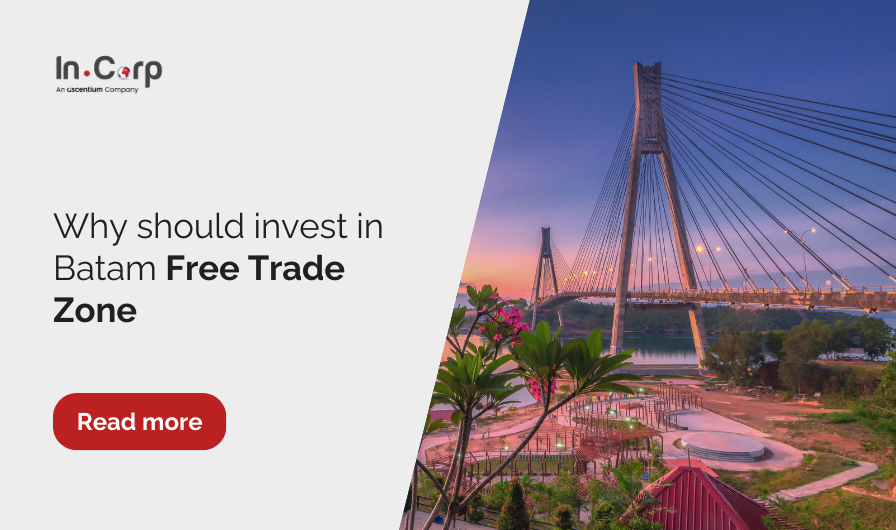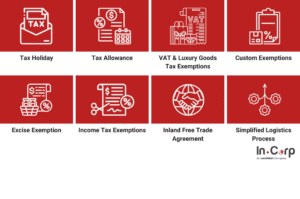Indonesia is emerging as a major player in international trade. One of its key areas is the Batam Free Trade Zone (FTZ), a special zone that provides businesses with a wide range of benefits. Thanks to its prime location, the Batam FTZ offers a strong competitive advantage and a compelling investment opportunity.
In this article, we’ll break down the concept of a Free Trade Zone and explain why leveraging its benefits could be a smart move for your business.
What is a Free Trade Zone (FTZ) in Indonesia?
A Free Trade Zone (FTZ) in Indonesia is a special area where businesses can import, produce, and export goods with lower taxes and more straightforward rules. These zones are designed to attract investors, boost exports, and support industrial growth.
The FTZ framework in Indonesia is established under Government Regulation Number 10/2012, which outlines the separation of customs territories from the rest of the country. Businesses within the FTZ are not required to pay import duties and taxes on goods brought into the zone, making business operations cheaper and more efficient.
Goods and services that are typically exempt from import duties and taxes include:
- Raw materials and components used in manufacturing
- Machinery and equipment
- Finished goods intended for export
- Certain services related to manufacturing, logistics, and trade
Batam, Bintan, and Karimun are among Indonesia’s key FTZ areas. These zones are managed by the Batam Indonesia Free Zone Authority (BIFZA), which helps businesses with licenses and infrastructure.
Why Batam Free Trade Zones are essential for business
For companies looking to expand or streamline their operations, Batam FTZs provide several clear benefits that enhance competitiveness and efficiency, such as:
Cost Reduction
Companies in FTZs benefit from tax exemptions, reduced import/export duties, and other financial incentives. These lower operating expenses and increased profit margins.
Faster Customs and Logistics
Goods entering or leaving FTZs face fewer customs procedures, allowing for quicker movement of products. This speeds up delivery times and improves supply chain efficiency.
Simplified Business Setup
FTZs often offer one-stop services for company registration, permits, and infrastructure support, making it easier and faster to start a business.
Access to Global Markets
By operating in an FTZ, businesses can reach international customers more easily due to simplified export processes and strategic locations near key shipping routes.
Broader Investment and Talent
FTZs attract foreign investors and skilled professionals. With international access, businesses can scale faster and enter new markets without risk.
Read more: Best business in Batam: 7 promising sectors to start
Key incentives of investing in Batam Free Trade Zones
Like in other zones, investors in Batam Free Trade Zones enjoy a variety of incentives created to reduce operational costs and enhance profitability.
Here’s the key incentives offered:
1. Tax Holiday
A Tax Holiday is offered to investors in 18 strategic industries. It allows full or partial exemption from corporate income tax for a set period, significantly reducing tax burdens during the early stages of operation.
2. Tax Allowance
Tax Allowance benefits apply to selected sectors and regions, providing additional tax deductions, easier depreciation, and longer loss carry-forwards to support business expansion.
3. VAT and Luxury Goods Tax Exemption
Goods brought into the FTZs are exempt from Value-Added Tax (VAT) and Luxury Goods Sales Tax, helping to reduce the cost of raw materials and production inputs.
4. Customs Exemptions
No import duties are imposed on goods brought into the zone, including raw materials, machines, and components.
5. Excise Exemption
Products manufactured inside the FTZs are not subject to excise duties, giving companies a pricing advantage, especially for large-scale production.
6. Income Tax Article 22 (Import) Not Collected
Article 22 of Income Tax on Imports is not applied within the zone, allowing businesses to save further on import-related taxes.
7. Inland Free Trade Agreement (FTA) Benefits
Businesses operating in the FTZs can also enjoy inland FTA advantages, which provide easier access to domestic and international markets with reduced trade barriers.
8. Streamlined Customs and Logistics
FTZs simplify customs processes, reducing paperwork and delays. This helps goods move faster and makes imports and exports more efficient.
Batam Free Trade Zones: A leading investment destination in Indonesia
Indonesia has several Free Trade Zones, with Batam and Bintan among the most prominent. These zones are vital in boosting exports and supporting national economic development.
Here’s why Batam FTZ stands out for investors:
Batam FTZ
Located near Singapore and Malaysia, Batam Island is a major center for industry and trade in Southeast Asia. Its strategic location gives it a decisive advantage in international shipping and logistics. Known for its focus on electronics and manufacturing, Batam operates under Government Regulation No. 62/2019, which officially recognizes its FTZ status.
Bintan FTZ
Bintan was declared a Free Trade Zone in 2007 under Government Regulation No. 47. The zone is split into two main areas: Bintan and Tanjungpinang. Unlike Batam, Bintan FTZ emphasizes tourism and maritime defense. Meanwhile, Tanjungpinang is focused on cultural tourism, halal industry development, fisheries, and business services.
Read more: Top 10 Batam industrial parks for foreign investments
Essential licenses required to start a business in Batam FTZ
To legally run a business in Batam’s Free Trade Zone (FTZ), you must secure several key permits. These licenses ensure compliance with Indonesian regulations and allow you to benefit from FTZ incentives.
1. Business Identification Number (NIB)
The NIB is your company’s main license, obtained through the Online Single Submission (OSS) system. It acts as a company registration certificate, an import-export license, and customs access.
2. Business License (Izin Usaha)
This license is specific to your business activity (e.g., manufacturing, trading, logistics). It’s also issued through the OSS system and must match the details in your NIB.
3. Import and Export Licenses
If your company plans to trade goods internationally, you’ll need Importer Identification Numbers (API) and relevant export-import permits from the Directorate General of Customs and Excise.
4. Environmental Permits (UKL-UPL/AMDAL)
Required if your operations affect the environment. These include UKL-UPL (Environmental Management and Monitoring Plans) or AMDAL (Environmental Impact Assessment), depending on your business scale.
5. Zone Business Permit from BP Batam
This permit allows your company to legally operate within the Batam FTZ and access zone-specific benefits like tax and customs incentives.
6. Other Sector-Specific Licenses
Other industries such as food, pharmaceuticals, and construction may need additional permits from relevant ministries or agencies.
Read more: How to Obtain KITAS Indonesia for Investment in Batam
Maximize your investment in Batam FTZ with InCorp
Starting a business in Batam FTZ doesn’t have to be complicated. With the proper support, you can seamlessly register your company and secure the necessary licenses to ensure smooth operations and sustainable growth in the region.
InCorp Indonesia (An Ascentium Company) offers end-to-end professional services to guide you through every stage of business setup, including:
- Company Registration: Fast and compliant set-up through our expert assistance, fully aligned with local regulations.
- Business License Assistance: We can help you get the correct licenses for your business without the hassle, so that you can focus on growth.
Fill out the form below to get started. Let us help you embark on a smooth and successful business journey in Batam Free Trade Zone.
Get in touch with us.
What you'll get
A prompt response to your inquiry
Knowledge for doing business from local experts
Ongoing support for your business
Disclaimer
The information is provided by PT. Cekindo Business International (“InCorp Indonesia/ we”) for general purpose only and we make no representations or warranties of any kind.
We do not act as an authorized government or non-government provider for official documents and services, which is issued by the Government of the Republic of Indonesia or its appointed officials. We do not promote any official government document or services of the Government of the Republic of Indonesia, including but not limited to, business identifiers, health and welfare assistance programs and benefits, unclaimed tax rebate, electronic travel visa and authorization, passports in this website.




